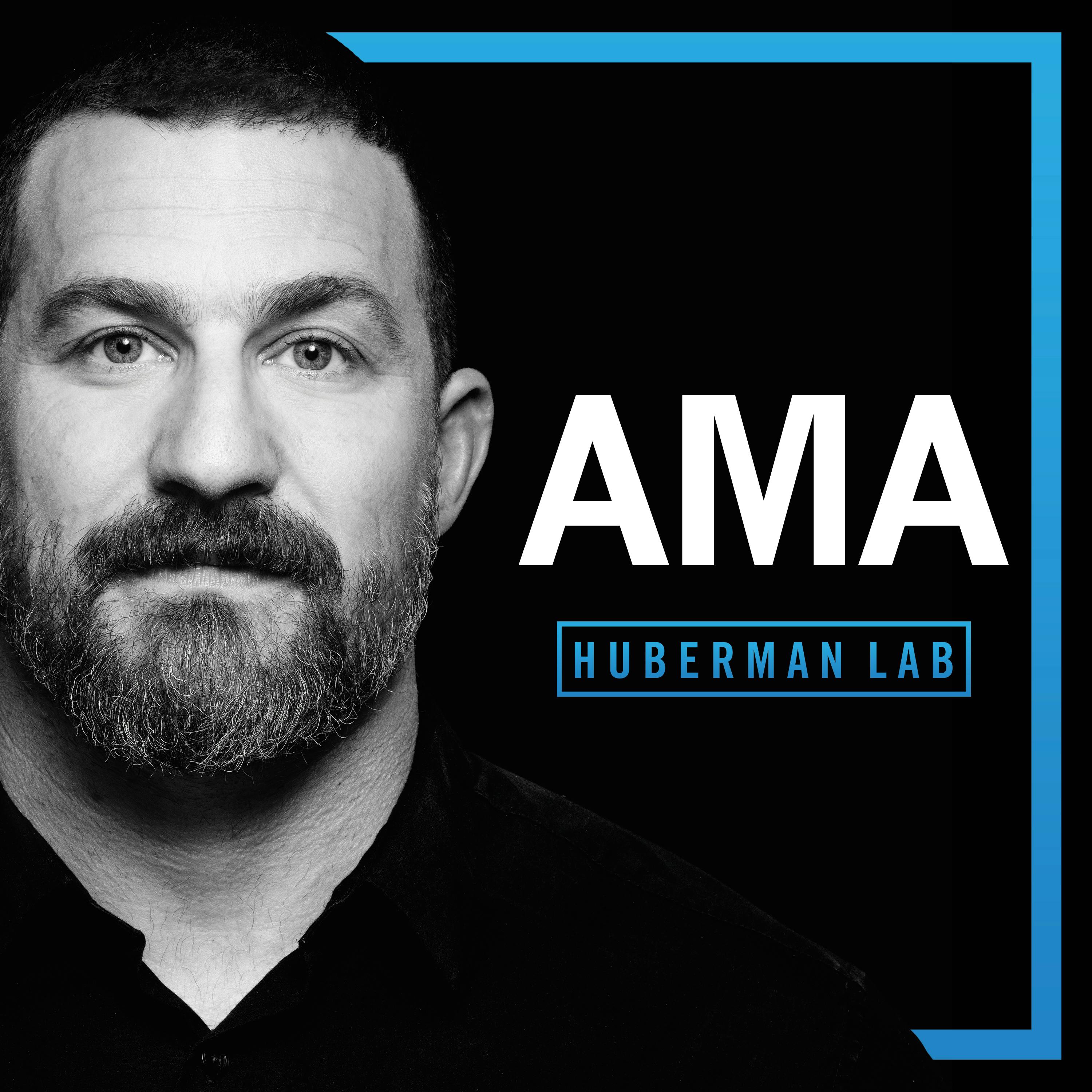
December 8, 2022 • 30min
AMA #2: Improve Sleep, Reduce Sugar Cravings, Optimal Protein Intake, Stretching Frequency & More
Huberman Lab

Key Takeaways
- Deep sleep (slow wave sleep) is vital for bodily repair and tissue regeneration. It occurs primarily in the first half of the night and is when growth hormone is released.
- To improve deep sleep:
- Avoid caffeine, alcohol, and cannabis within 8-12 hours of bedtime
- Avoid eating large meals 2-3 hours before bed
- Exercise moderately for 60 minutes earlier in the day (at least 6 hours before bed)
- Consider supplements like magnesium threonate, theanine, apigenin, and inositol
- Balancing deep sleep and REM sleep across the night is ideal for optimal sleep architecture and health benefits.
- Most adults need 6-8 hours of sleep per night to get sufficient deep and REM sleep cycles.
- Sleep trackers can estimate sleep stages but are not as accurate as lab-based polysomnography.
- The Huberman Lab Premium subscription was launched to support the free podcast and fund human research on health protocols.
Introduction
This episode is an Ask Me Anything (AMA) preview from the Huberman Lab Premium subscription. Dr. Andrew Huberman, a neuroscience professor at Stanford, answers listener questions about improving sleep quality, particularly deep sleep. He explains the science behind sleep stages and provides evidence-based recommendations for enhancing slow wave sleep.
Topics Discussed
Understanding Deep Sleep (2:00)
Dr. Huberman explains that deep sleep, also called slow wave sleep, is crucial for:
- Bodily tissue repair
- Growth hormone release
- Brain health and debris clearance
Deep sleep occurs primarily in the first half of the night. Dreams during this stage tend to be less emotional compared to REM sleep dreams. The metabolic processes during deep sleep are also distinct from other sleep stages.
Factors That Disrupt Deep Sleep (8:01)
Several factors can negatively impact deep sleep quality and duration:
- Alcohol consumption within 8 hours of bedtime
- Caffeine intake within 8-12 hours of bedtime
- Cannabis or CBD use within 8-12 hours of sleep
- Eating large meals close to bedtime
Dr. Huberman emphasizes avoiding these factors to improve deep sleep. However, he notes that going to bed too hungry can also disrupt sleep, so finding the right balance is key.
Exercise and Deep Sleep (12:01)
Research shows that exercise can significantly improve deep sleep quality:
- 60 minutes of moderate-intensity exercise (around 60% VO2 max)
- Performed at least 6 hours before bedtime
- Enhances slow wave sleep stability and power
While the study focused on cardiovascular exercise, Dr. Huberman suggests resistance training may have similar benefits if done far enough from bedtime.
Supplements for Improving Sleep (16:01)
Dr. Huberman discusses several supplements that can enhance sleep quality:
- Magnesium threonate or bisglycinate
- Theanine (may enhance dream vividness)
- Apigenin (found in chamomile)
- Inositol (particularly myoinositol)
He recommends taking these 30-60 minutes before bed. Inositol (900mg) may be especially helpful for those on low-carb diets or who have trouble falling asleep when hungry.
Balancing Deep Sleep and REM Sleep (22:02)
Dr. Huberman addresses the importance of balancing deep sleep and REM sleep:
- Both stages serve important functions for physical and mental health
- Aim for roughly equal amounts of deep and REM sleep across the night
- Getting 6-8 hours of total sleep increases the likelihood of balanced sleep architecture
While there's no definitive research on the ideal ratio, striving for balance is a good goal.
Sleep Duration and Individual Needs (24:02)
Dr. Huberman discusses sleep duration requirements:
- Most adults need 6-8 hours of sleep per night
- Children and adolescents typically need more sleep
- Individual needs vary based on stress, physical activity, and other factors
- Daytime sleepiness may indicate insufficient nighttime sleep
He notes that occasional afternoon naps don't necessarily mean nighttime sleep is inadequate.
Sleep Tracking and Accuracy (26:02)
Dr. Huberman touches on sleep tracking technology:
- Consumer sleep trackers (e.g., Whoop, Oura, Eight Sleep) provide estimates of sleep stages
- These devices are not as accurate as laboratory polysomnography
- They can still be useful for tracking general sleep patterns and trends
He uses multiple tracking methods to get a more comprehensive picture of his sleep quality.
Huberman Lab Premium Subscription (28:03)
Dr. Huberman explains the purpose of the new premium subscription:
- Support the free weekly Huberman Lab podcast
- Fund human research on health and performance protocols
- Provide subscribers with exclusive content and AMA sessions
- Tiny Foundation will match donations for research funding
The subscription costs $10/month or $100/year and offers various benefits to subscribers.
Conclusion
Improving deep sleep quality is crucial for overall health and well-being. By implementing evidence-based strategies like avoiding disruptive substances, exercising regularly, and considering targeted supplements, most people can enhance their slow wave sleep. Balancing deep sleep with REM sleep and getting adequate total sleep duration (typically 6-8 hours for adults) are key goals for optimal sleep architecture. While consumer sleep trackers can provide useful insights, they are not as accurate as laboratory sleep studies. The new Huberman Lab Premium subscription offers an opportunity for listeners to support research and gain access to exclusive content, including in-depth answers to their health and science questions.







